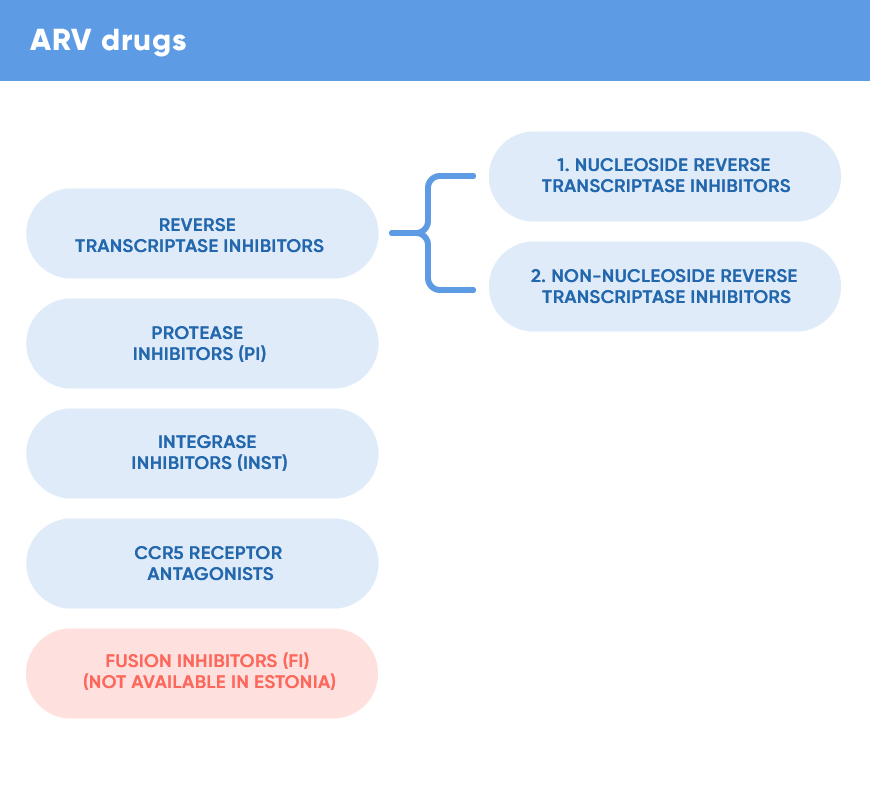ARV drugs
Antiretroviral drugs (ARV drugs) are used to treat people with HIV. Every medication has its specific task in the HIV life cycle for stopping the virus from progressing. Treatment with only one active substance is not effective. ARV therapy is a combined treatment where usually 2 to 3 active substances are used. An individual treatment regimen will be prepared for every person with HIV based on their specific needs.
In addition to adult ARV drugs there are paediatric drugs in different pharmaceutical forms: dilutions, syrups and chewable tablets. Based on their mechanism of action, ARV drugs are classified in five groups.

How do ARV drugs work?
Modern ARV drugs can stop the life cycle of a virus in four different ways by preventing
- the entry of the virus in a cell;
- the reverse transcription of viral RNA into DNA;
- the entry of viral DNA in chromosomes;
- the processing of viral proteins into pieces of suitable sizes necessary for assembling new viruses.
How are ARV drugs taken?
ARV drugs are taken every day at the same time. Once you have started treatment, be sure to stick to the treatment regimen prescribed by your doctor and be consistent in taking your medications. If the medication combination suits you and you feel good, you can take these medications for a long time. No resistance will develop when taking the medications regularly. You need not worry about having taken them for years already.
Side effects of ARV drugs
All drugs have side effects. The side effects of ARV drugs may last for a few days or a few weeks or even years. When you notice any symptoms or have complaints, go see an infectious disease doctor to find out whether you are experiencing side effects of ARV drugs and to decide on how to continue the treatment. Similar medications may have different side effects. A combination of ARV drugs that will work for you will be determined in consultation with your attending physician.
At the start of ARV therapy you may experience short-term side effects: tiredness, dizziness, headache, nausea, vomiting, diarrhoea. More serious side effects are a fever and a rash. If this is accompanied by swelling in the facial area or in the throat, go to the emergency room at once.
What is drug resistance?
Drug resistance means that the drugs no longer have the intended effect. The main reason for drug resistance is failure to adhere to the treatment regimen. If drugs are not taken as prescribed, viruses may mutate. Mutated viruses no longer respond to ARV drugs, leading to drug-resistant forms of HIV. ARV drugs used may lose their effect completely or partly and include other drugs in the same group of drugs not yet used for treatment. Constantly breaking the treatment regimen may lead to a situation where no drug will work for you. So it is essential to stick to your treatment regimen even if you are feeling better and it seems like you don’t need any medication at all.
Drug resistance may transfer from person to person; this is called transferable resistance. It means that should you get infected, you may get HIV that is already resistant to drugs. A person with HIV may be resistant to one or two ARV drugs even before they start ARV therapy. Luckily, the situation in Estonia is not bad and according to latest research about 7% of people infected with HIV have transferable resistance to drugs.
Drug interaction
Drug interaction is understood to mean a reaction between two or more drugs taken at the same time. Drug interaction may improve or reduce the effect of a drug or cause serious side effects.
It is important to know which ARV drugs you are on, and inform doctors thereof. When starting with new drugs the drug interaction must always be checked. And where necessary, the treatment must be adjusted accordingly. This applies to both prescription drugs and over-the-counter medications. Tell your infectious disease doctor about all other drugs that you are taking.
Using ARV drugs in other situations
In certain cases, ARV drugs are used as a preventive measure for protection against HIV.
- PEP (post exposure prophylaxis)
- PrEP (pre-exposure prophylaxis)
- From mother to child HIV transmission prophylaxis
- Newborn prophylaxis
- If a woman has not taken the drugs during pregnancy
What is adherence?
Adherence means regularly taking drugs as prescribed to:
- prevent the replication of HIV;
- prevent the destruction of the immune system;
- prevent resistance to drugs;
- improve the quality of life;
- reduce the risk of HIV transmission.

